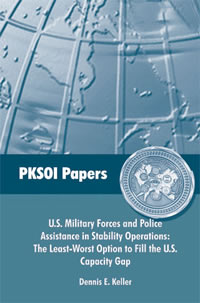U.S. Military Forces and Police Assistance in Stability Operations: The Least-Worst Option to Fill the U.S. Capacity Gap

Authored by Colonel (Ret.) Dennis E Keller.
August 2010
58 Pages
Brief Synopsis
Establishing an effective local police force is one of the most critical elements of successful counterinsurgency and stability operations, but is a task for which the U.S. government is poorly prepared and lacks capacity. This monograph retraces the recent history of U.S. foreign police training, from the well-coordinated effort by the U.S. Agency for International Development (USAID) from 1961 to 1974, the U.S. congressional prohibition of the use of foreign assistance funds for police training which ended the USAID police training role in 1974, and the subsequent evolution of a patchwork approach to U.S. foreign police training involving up to 30 departments and agencies, a variety of private police contractors, and multiple fund appropriations. Despite this bureaucratic complexity, the key principles for developing effective local police in stability operations remain the same. There must be a distinction between stability policing and community based policing, with a transition from the former to the latter at the appropriate phase of stability operations. Normative standards are critical for effective community based policing, and must be established by shaping police organizational subculture in the context of local societal culture. This monograph explores the way ahead to achieve these goals for effective local police in stability operations in the current complex and challenging operational environment.
Summary
Establishing an effective local police force is one of the most critical elements of successful counterinsurgency (COIN) and stability operations, but it is a task for which the U.S. Government is the least prepared and capable. The establishment of an effective police force is critical to security sector reform, justice sector reform, and the successful transition to the host nation’s security forces. But the United States lacks the institutional capacity to provide an immediate and coordinated civilian police training and advisory effort, particularly in a failed or fragile state. Because hesitation in addressing such problems causes delays in forming and training new police forces, and, even worse, emboldens corrupt and abusive locals who enable insurgents, terrorist groups, and organized criminal networks, the U.S. military must be prepared to support stability operations at regional level and below by assessing, advising, and even training police units until such time as civilian police trainers and mentors arrive on the ground.
Army doctrine emphasizes the importance of community-focused civilian police forces during stability operations and suggests that clear separation of police and military roles is essential to successful rebuilding. Doctrine also recognizes that military forces may have to perform police functions during the initial response. But history is replete with examples of local police becoming targets of opportunity for insurgencies; having trained, operationally ready police is always important and no more so than in current operations in Afghanistan and Iraq.
At one time, the U.S. Government had a better institutional response than it does now. From 1954 to 1974, first the International Cooperation Administration (ICA), and then its successor organization, the U.S. Agency for International Development (USAID), established in 1961, presented balanced programs providing technical advice, training, and equipment for civil and paramilitary police organizations. In 1963, USAID established the International Police Academy in Washington, DC, to train foreign police officers. At its peak, the USAID arm had 590 permanent employees, to include staff at the International Police Academy, and advisors in 52 countries at different times. This academy graduated over 5,000 students from 77 countries until it was closed because of congressional fears that the program approved, advocated, or taught torture techniques that had damaged the image of the United States. Thus, legislation was passed that prohibited foreign assistance funds for training and financial support of law enforcement forces within or outside the United States. The reluctance to be associated with local police continues to haunt U.S. Government efforts to train police of fragile and failed states to this day.
As a result, the U.S. Government continues to lack the capacity for timely deployment of civilian police trainers in the early phases of stability operations. Using military personnel to train and advise civilian police is being justifiably criticized. Military personnel, even military police, are not prepared to train and advise civilian police in most tasks. Instead, their training is skewed toward the higher end stability policing tasks such as riot control, convoy security, motorized patrolling, establishing checkpoints, and weapons training. The emphasis on such tasks makes it more difficult to transition to community-based policing. A clear delineation needs to be established between stability policing and community-based policing, with phased transitions as appropriate. Focusing only on the technical skills must cease, while instruction in such normative principles as responsiveness to the community, accountability to the rule of law, defense of human rights, and transparency to scrutiny from the outside, must be institutionalized. Such an adjustment will result in an organizational culture that abjures abuse. Such success will require embedding of quality advisors for a significant period of time, though even then expectations must be kept realistic.
Access Full Report [PDF]: U.S. Military Forces and Police Assistance in Stability Operations: The Least-Worst Option to Fill the U.S. Capacity Gap
|
NEWSLETTER
|
| Join the GlobalSecurity.org mailing list |
|
|
|

